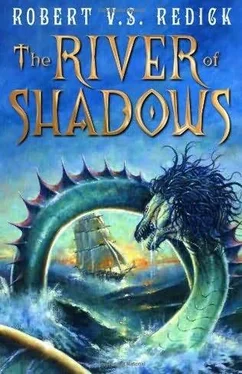Robert Redick - The River of Shadows
Здесь есть возможность читать онлайн «Robert Redick - The River of Shadows» весь текст электронной книги совершенно бесплатно (целиком полную версию без сокращений). В некоторых случаях можно слушать аудио, скачать через торрент в формате fb2 и присутствует краткое содержание. Жанр: Фэнтези, на английском языке. Описание произведения, (предисловие) а так же отзывы посетителей доступны на портале библиотеки ЛибКат.
- Название:The River of Shadows
- Автор:
- Жанр:
- Год:неизвестен
- ISBN:нет данных
- Рейтинг книги:4 / 5. Голосов: 1
-
Избранное:Добавить в избранное
- Отзывы:
-
Ваша оценка:
- 80
- 1
- 2
- 3
- 4
- 5
The River of Shadows: краткое содержание, описание и аннотация
Предлагаем к чтению аннотацию, описание, краткое содержание или предисловие (зависит от того, что написал сам автор книги «The River of Shadows»). Если вы не нашли необходимую информацию о книге — напишите в комментариях, мы постараемся отыскать её.
The River of Shadows — читать онлайн бесплатно полную книгу (весь текст) целиком
Ниже представлен текст книги, разбитый по страницам. Система сохранения места последней прочитанной страницы, позволяет с удобством читать онлайн бесплатно книгу «The River of Shadows», без необходимости каждый раз заново искать на чём Вы остановились. Поставьте закладку, и сможете в любой момент перейти на страницу, на которой закончили чтение.
Интервал:
Закладка:
A vast city surrounded them. It was surely thrice the size of Etherhorde, greatest city of the North. Over rolling hills it spread, a city of stone houses, thatched roofs, dark and still in the gathering night. Narrow, sharp-roofed towers and oblong domes cast shadows over the lower structures. They had risen inside the city’s massive, many-turreted wall.
But all that was at a distance. Thasha saw now that the flooded shaft did not truly end where she had supposed: it broadened into a wide basin, like a wineglass atop its stem. There was as yet no water in this upper basin, though it was clearly designed to be filled.
Projecting into the basin was a long bridge, supported by stone arches and ending in a round, railed platform overlooking the shaft where the Chathrand floated. Even now, dark figures were running out along this walkway, some bearing torches, their silver eyes glinting in the firelight. They were shouting to one another in high excitement. A great number of dogs loped at their feet.
“There is a shipyard!” cried someone. And there it was: indeed the whole eastern rim of the basin was a dark jumble of ships-ships in dry dock, raised on stilts; ships floating in a sealed-off lock, from which their spars poked out like the limbs of winter trees. Ships wrecked and abandoned in a dry, deserted square.
Thasha looked at the mighty river. Above the falls it rippled down a series of low cascades, like a giant staircase, each step flanked by statues in white stone-animals, horses, dlomu, men-that towered over the modest homes. Away to the south the cliffs rose again. There was another mighty waterfall, and above it more roofs and towers looking down on the city.
“Night has come,” said Bolutu, who was clinging close beside Neeps. “Why is the city dark? There should be lamps in the windows-countless lamps, not these scattered few. I don’t understand.”
The dlomu reached the platform at the walkway’s end. They leaned out over the rails, looking down at the ship, mighty and helpless below. They were pointing, shouting, grasping at one another in shock. There was just enough light for them to know the crew was human.
“Thashiziq!”
Ibjen’s voice. Thasha saw him, waving excitedly from a platform. The other dlomu left a little space about him, looking askance. As though in greeting one of them he had become almost a stranger himself.
She waved. Ibjen was chattering, explaining; his countrymen did not appear to be paying attention.
“Pazel should be here,” said Neeps. “He should be with us right now, seeing this.”
“Yes,” said Thasha with feeling, turning to him. But the distance in Neeps’ eyes told her that his words had been meant for Marila alone.
“Are they talking?” someone shouted from above. “Listen! Listen to them talk!”
Then Bolutu laughed. “Of course they’re talking, brothers! There’s not a tol-chenni on this ship! Hail! I am Bolutu of Istolym, and it is long-terribly long-since I walked among my people! I want black beer! I want candied fern and river clams! How long before you bring us ashore?”
His question was met with silence. The dlomu on the walkway shuffled, as though all were hoping someone else would speak. Then Ibjen startled everyone by slipping under the rail. Deaf to the shouts of his countrymen, he scrambled out onto the cornice of the last stone pillar. It was as close as one could get to the ship. In a somewhat lower voice he called to them again.
“His Lordship the Issar of Masalym must decide how to welcome you. Don’t fear, though. We are a kindly city, and won’t leave you long in distress.”
“Just so long as you don’t leave us to sink in this blary well,” said Marila.
“Ibjen,” called Neeps, “where’s Prince Olik, and why in the Nine Pits did he jump overboard?”
“His Majesty has gone to the Upper City,” said Ibjen, “to the Palace of the Issar. I am sure he will speak well of you-generally well.”
“Why did you abandon us?” shouted the mizzen-man, Mr. Lapwing, somewhat crossly.
“I was never your prisoner, sir,” shot back the youth, “and Olik bade me come ashore with him. As you know, I gave him my promise.”
“Your worthless promise,” shouted Alyash.
“People of Masalym,” said Bolutu, raising his voice, “why are your houses unlit?”
“Because we’re all out here staring at you,” ventured someone, and the dlomu on the walkway laughed. Thasha felt a prickling of her skin: that was a forced and nervous laugh. A laugh like a curtain drawn over a corpse.
“Ibjen,” she shouted, obeying a sudden impulse, “we’re running out of food.”
The crowds above grew quiet, thoughtful. “I’ve told them, Thashiziq,” said Ibjen. Then all at once he gave her a sly look. “There’s a saying among us, that even after a hundred wealthy generations, the dlomu would never forget the feeling of hunger. Barren land and empty sea: from out this womb came I and thee. In my father’s village they still teach us those rhymes. We’re old-fashioned out there, you know.”
A new kind of grumbling came from the crowd above. Thasha saw Bolutu turn away, hiding a smile. “We’ll feed them, stupid boy,” called someone. “What do you take us for?”
There were uneasy nods, but no one moved. The sun-and-leopard flag rippled in the wind. Then a very old dlomic woman cried out in a voice like a shrieking hinge:
“You’re human!”
It was an accusation.
“That’s right, ma’am,” ventured Fiffengurt.
“Humans! Human beings! Why don’t you tell us how long?”
Captain Rose, gazing upward with a malevolent frown, echoed her words. “How long?”
“Tell us!” cried the old woman again. “You think we don’t know why you’ve come?”
Now the other dlomu mobbed the woman, hushing her urgently. The woman clung to the rail, shouting, her limp hair tumbling across her face. “You can’t fool us! You’re dead! Every one of you is dead! You’ve come on a ghost-ship out of the Ruling Sea, and you’re here because it’s the end of the world. Go on, tell us how long we have to live!”
Faces in the Glass
26 Ilbrin 941
There are guests and there are prisoners, and, very rarely, persons whose status in a house is so unusual that no one can assign them a category. Among the latter was an aging man with a bald, veined head and broad shoulders on the Island of Simja. For three months he had been a secret resident in the North Tower of Simjalla Palace, in a comfortable round room with translucent glass over the window and a fire always crackling in the hearth.
Making his case even more unusual was the fact that his presence, his very existence, was known to just three people on earth. One was his middle-aged nurse, who was quiet and attentive and rubbed brysorwood oil into his leathery heels. The other was a doctor who commended him for his habit of daily calisthenics. The third was King Oshiram, monarch of Simja. The nurse did not have a name for her silent patient. Only the men were aware that he was Thasha’s father, Admiral Eberzam Isiq.
It was barely a fortnight since he had recovered his name. It had been cooked out of him during his seven weeks underground, along with most of his memory, all of his pride. Like bricksteak, that detested navy product he’d choked down for decades, salt beef dried in the ovens against the weevils and the damp, food you had to attack with a chisel. After a week submerged in brine it might soften, might absorb something again-or it might not. So it was with the admiral. He had literally been pulled from an oven. From a kiln in a forgotten dungeon under Simjalla, where he had barricaded himself against the monster rats.
He was a stout old veteran, well muscled and formidable even in scarlet pajamas, his new uniform, worn as unself-consciously as battle fatigues. He stared for hours at his slippers, or his bed. He had survived not only the rats but the agony of deathsmoke, from which addiction the doctor was trying to help him break free.
Читать дальшеИнтервал:
Закладка:
Похожие книги на «The River of Shadows»
Представляем Вашему вниманию похожие книги на «The River of Shadows» списком для выбора. Мы отобрали схожую по названию и смыслу литературу в надежде предоставить читателям больше вариантов отыскать новые, интересные, ещё непрочитанные произведения.
Обсуждение, отзывы о книге «The River of Shadows» и просто собственные мнения читателей. Оставьте ваши комментарии, напишите, что Вы думаете о произведении, его смысле или главных героях. Укажите что конкретно понравилось, а что нет, и почему Вы так считаете.












